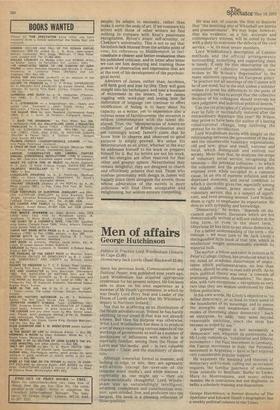Men of affairs
George Hutchinson
Politics in Practice Lord Windlesham (Jonathan Cape £5.00) Democracy Jack Lively (Basil Blackwell £3.00) Since his previous book, Communication and Political Power, was published nine years ago, Lord Windlesham has acquired appropriate credentials for his present subject. He has been able to draw on his own experience as a member of Mr Heath's government, in which he was finally Lord Privy Seal and Leader of the House of Lords and before that Mr Whitelaw's deputy in Northern Ireland.
Not that he is offering us an illumination of the Heath administration. Indeed he has hardly anything to say about it that was not already known. But then his purpose was otherwise. What Lord Windlesham has done is to produce a set of essays examining various aspects of the workings of government as well as a number of institutions of influences with which he is especially familiar, among them the House of Lords and 'the media', and in two valuable chapters Ulster and the machinery of direct rule.
Although somewhat formal in manner, and lacking in edge, or bite, they are agreeably well-written (except for over-use of the tiresome word 'media'), and while discreet regrettably so, one might say they are characteristically thoughtful. Lord Windlesham was an outstandingly intelligent, informed, considerate and conscientious minister, open-minded, free, and proficient into the bargain. His book is a pleasing reflection of those qualities. He was not, of course, the first to discover that "the besetting sins of Whitehall are inertia and possessiveness". We may hope, however, that his evidence, as a fair, accurate and contemporary witness, will be noted by those with a duty to overcome the defects of the civil service, ie, its most senior members.
Lord Windlesham's description of Cabinet. methods and the official arrangements surrounding, underlying and supporting them is timely, if only for this observation on the convention of collective responsibility, now broken by Mr Wilson's 'dispensation' to the many ministers opposing his European policy: "In practice not all meetings of the Cabinet will be of one mind, but in the end, unless a minister wishes to press his differences to the point of resignation, he has to accept that the collective decision of his colleagues should override his own judgment and individual political desires." Can the old principles of Cabinet government ever be fully or successfully restored after the extraordinary departure this year? Mr Wilson may prove to have been the author of a lasting constitutional change, long outliving the pretext for its introduction.
Lord Windlesham dwells with insight on the relationship between the govenment of the day and the innumerable voluntary organisations, old and new, great and small, national and local, which distinguish and enliven our society. More than that, he analyses the scope of voluntary social service, recognising the, tensions the potential collisions to which the volunteer and the professional are often exposed even while occupied in a common cause. In an era of extreme inflation and the depressed economic and social condition to which it inevitably gives rise, especially among the middle classes, prime source of much voluntary service, this is a subject of significant, and even pressing interest. Lord Windlesham is right to emphasise its importance. He does so with sympathy and knowledge. "Democracy," he writes, "depends on discussion and debate. Decisions which are not democratically arrived at will not endure in the long term, or even in the short term." OtherWise he has little to say about democracy. For a better understanding of the term the concept we must turn to Mr Jack Lively's distinguished little book of that title, which in intellectual weight immeasurably exceeds its material bulk.
The author, a fellow and tutor in politics at St Peter's College, Oxford, has produced what is to my mind an academic dissertation of impor tance which parliamentarians, no less than others, should be able to read with profit. As he .says, political theory was once "a concern of practising politicians themselves." No more, alas, with rare exceptions exceptions so very rare that they are seldom understood by their fellow politicians.
In his own words, Mr Lively's objective is "to define democracy, or at least to trace some of the boundaries of its meanings, and to assess the strengths and weaknesses of different modes of theorising about democracy." Such an enterprise, he adds, "may seem beyond reasonable ambition, since the term has become so soiled by use."
A 'popular' regime is not necessarily a 'democratic' one, whatever is pretensions. As Mr Lively reminds us, "totalitarian and illiberal movements the Nazi movement in Germany, the Fascist movement in Italy, the Peronista movement in Argentine have in fact enjoyed very considerable popular support."
He examines the meaning and theories of democracy and its ends, calling out, as occasion requires, the familiar pantheon of witnesses from Aristotle to Bentham, Burke to Locke, Marx to Montesquieu, and many others besides. He is instructive but not dogmatic, as befits a scholarly training and disposition.
George Hutchinson. a former director of The Spectator and Edward Heath's biographer, has a weekly political column in the Times.










































 Previous page
Previous page